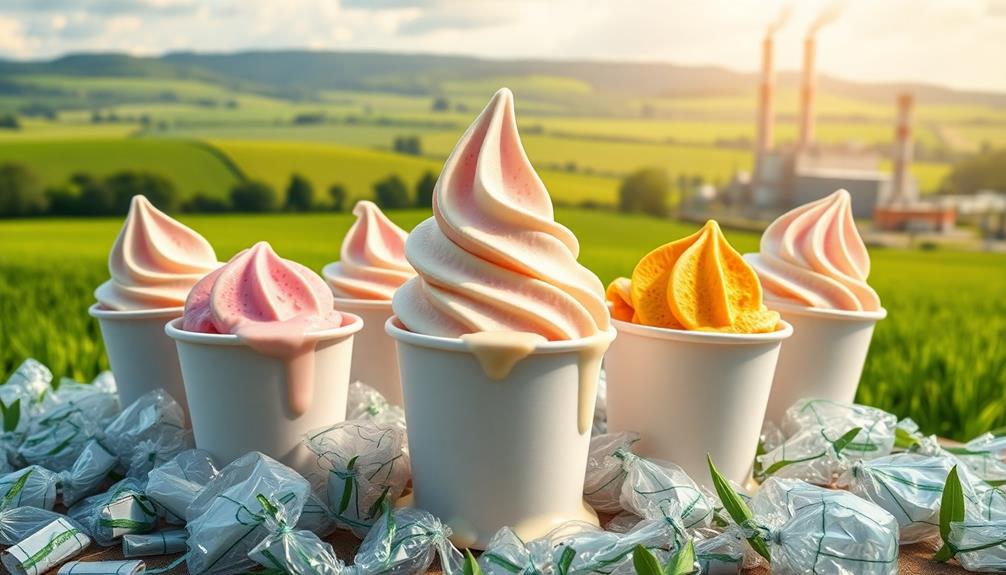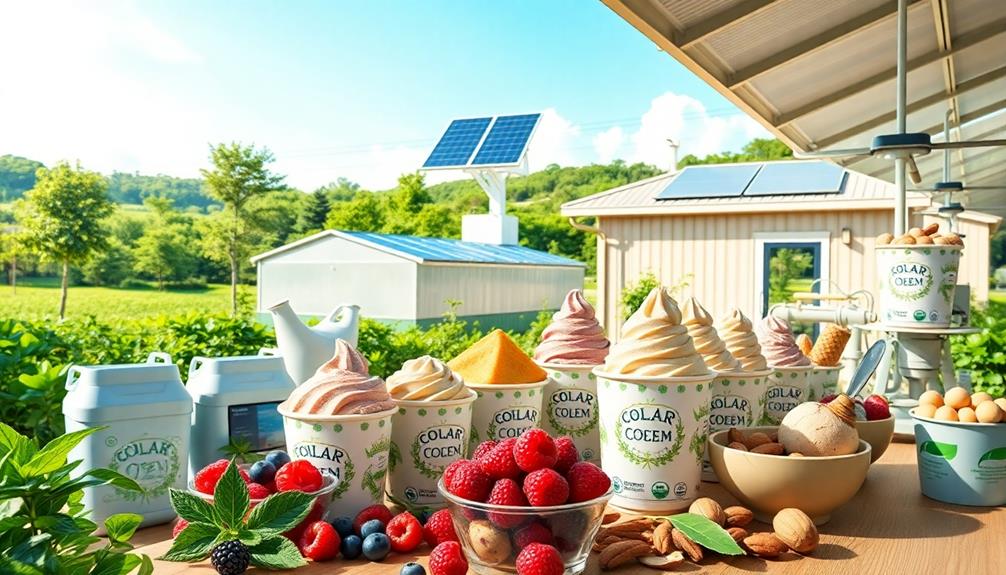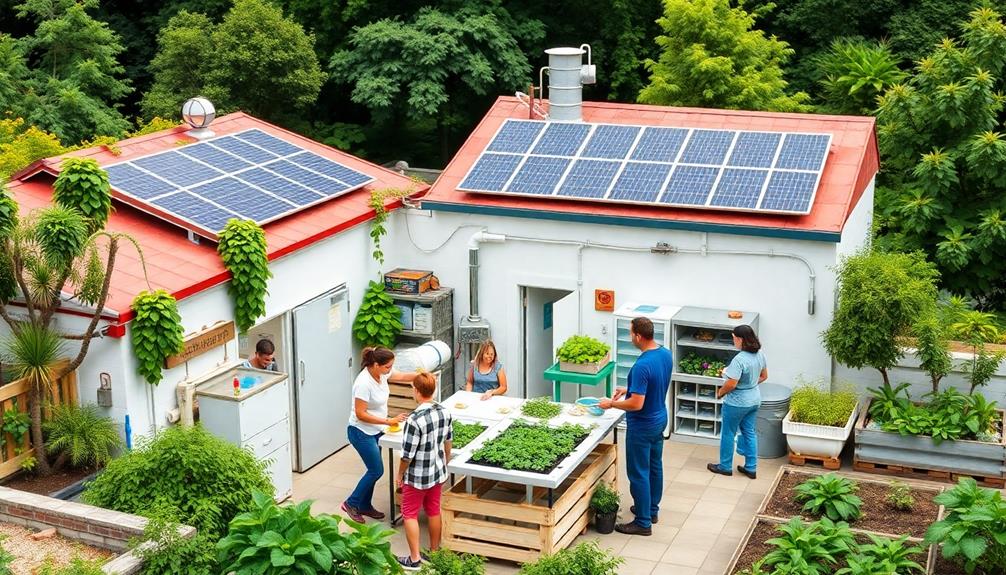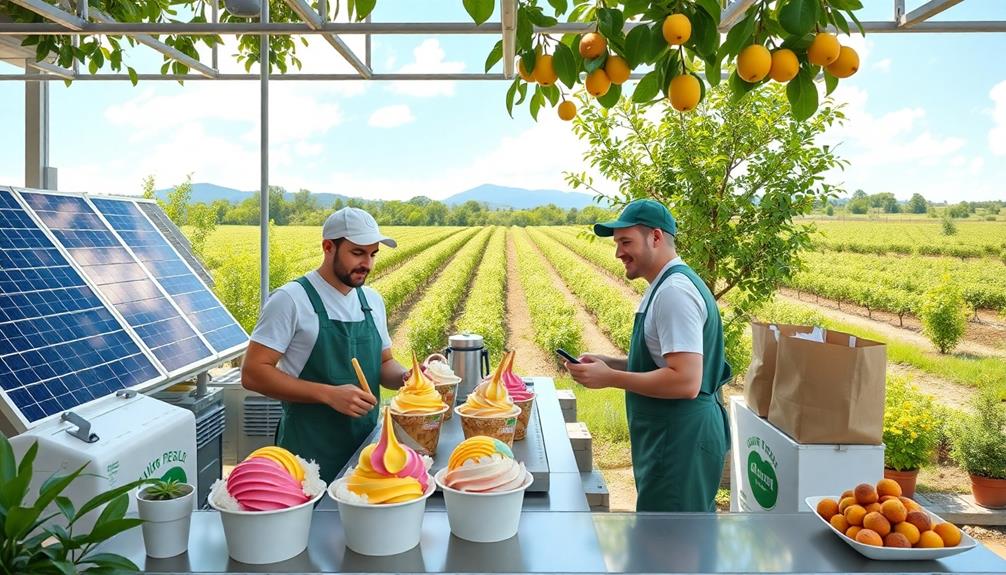Sustainability in ice cream production and packaging matters more than ever. With only 14% of plastic packaging being recycled, the industry faces serious waste issues. You'll find that many brands are shifting to eco-friendly practices by using renewable energy and plant-based ingredients. Notable brands like Judes Ice Cream lead the way with carbon-negative efforts, while others aim for 100% recyclable packaging by 2025. Consumers are increasingly favoring these sustainable options, encouraging companies to improve. By understanding these practices, you can make informed choices that support environmental initiatives and enhance brand loyalty. Discover how these trends are shaping the future.
Key Takeaways
- Sustainable ice cream production involves adopting renewable energy sources and reducing water usage through plant-based ingredients.
- Brands are increasingly committing to eco-friendly packaging, with 75% pledging sustainability initiatives.
- Consumer awareness and education are crucial for driving demand for sustainable practices in the ice cream industry.
- The shift to plant-based ingredients helps lower greenhouse gas emissions and aligns with growing consumer preferences for vegan options.
- Innovative brands like Judes Ice Cream and Ben & Jerry's are leading the way in sustainable sourcing and packaging practices.
Traditional Packaging Challenges

The ice cream industry grapples with significant challenges when it comes to traditional packaging. The conventional take-make-dispose model means that only about 14% of plastic packaging gets recycled globally. This low recycling rate contributes to staggering amounts of plastic waste, with nearly 40% of plastic packaging ending up in landfills. This situation leads to long-term ecological impacts and increased pollution, threatening our environment's health.
Transitioning away from traditional plastic isn't easy for the ice cream sector. The industry heavily relies on single-use plastics, which are often linked to climate change and environmental health issues.
Additionally, a worrying one-third of plastic packaging infiltrates ecosystems, including oceans, posing threats to marine life and biodiversity. There's a growing urgency to find sustainable packaging solutions that can replace these harmful materials.
As consumer awareness of these issues rises, the pressure mounts for the ice cream industry to embrace environmental sustainability. Adopting innovative, eco-friendly packaging alternatives is essential to reduce plastic waste and protect our planet for future generations.
Only by addressing these challenges can the ice cream industry contribute to a more sustainable future.
Consumer Demand for Sustainability

As an eco-conscious consumer, you likely favor brands that prioritize sustainability in their practices.
This shift not only influences your purchasing decisions but also impacts brand loyalty, making it essential for companies to align with your values.
Education about eco-friendly packaging can further enhance your awareness and satisfaction, driving demand for innovative solutions in the ice cream industry.
Eco-Conscious Consumer Preferences
Eco-conscious consumers are increasingly leaning toward brands that prioritize sustainability in their operations. This shift in preferences indicates that you value companies that adopt sustainable practices.
In fact, a remarkable 81% of global consumers like you actively seek out brands with environmental initiatives. With 75% of companies committing to sustainable packaging, the demand for eco-friendly options is undeniable. However, only 30% are currently prepared to meet these goals, highlighting a gap in the market.
As you become more aware of the impacts of plastic waste—where a staggering 40% of plastic packaging ends up in landfills—you might find yourself gravitating toward options that offer recyclable, compostable, or reusable packaging.
This is where innovative solutions, like edible films, come into play, projected to reach a market size of $4.2 billion by 2028. Such advancements reflect a strong consumer desire for waste-reducing alternatives.
Impact on Brand Loyalty
Growing numbers of consumers are making brand loyalty contingent on sustainability practices, shaping how companies approach their operations. With 81% of global consumers prioritizing companies with environmental initiatives, it's clear that sustainable packaging plays a pivotal role in your purchasing decisions. Brands that commit to eco-friendly packaging not only reduce their carbon footprint but also cultivate a loyal customer base.
Here's how consumers view sustainability in brand loyalty:
| Factor | Impact on Brand Loyalty | Consumer Preference |
|---|---|---|
| Sustainable Packaging | Boosts brand reputation | 81% prioritize environmental initiatives |
| Transparency in Efforts | Increases trust and loyalty | Consumers support aligned values |
| Innovative Solutions | Enhances brand perception | Edible films market projected to grow |
| Environmental Concerns | Drives purchasing decisions | 75% of companies committing to sustainability |
| Eco-Friendly Initiatives | Improves customer satisfaction | Higher likelihood of repeat purchases |
As you can see, aligning your brand with eco-conscious practices can greatly enhance brand loyalty and satisfaction. By prioritizing sustainability, you not only address environmental concerns but also connect with consumers who share your values.
Importance of Education
Education plays an essential role in shaping consumer demand for sustainability, especially in the ice cream industry. As you become more aware of the environmental impact of your choices, you're likely to prefer brands that prioritize sustainable practices.
With eco-conscious consumers driving this demand, it's clear that education is imperative for promoting environmentally friendly options in ice cream production and packaging.
Despite 75% of companies committing to sustainable packaging, only 30% are truly ready to meet their sustainability goals. This gap illustrates the need for increased consumer awareness and education.
By understanding the advantages of eco-friendly packaging, like edible films projected to reach $4.2 billion by 2028, you can make informed decisions that support innovative solutions to waste issues.
Your awareness can influence brand behavior. As sustainability becomes essential for competitiveness in the ice cream industry, educating yourself about the effects of packaging waste empowers you to demand more responsible practices.
The more you know, the better choices you can make, ultimately shaping a more sustainable future for both the industry and the planet.
Eco-Friendly Production Methods

When it comes to eco-friendly ice cream production, switching to renewable energy sources and embracing plant-based ingredients can make a big difference.
You can see how companies are reducing their carbon footprints by harnessing solar and wind power while also cutting down on water usage with plant-based options.
These methods not only cater to growing consumer preferences but also pave the way for a more sustainable future in the ice cream industry.
Renewable Energy Utilization
Sustainable ice cream production is increasingly embracing renewable energy sources, altering the way manufacturers operate. By investing in solar and wind energy, companies are considerably reducing their carbon footprints. For instance, Unilever has committed to achieving zero emissions in its operations by 2030, highlighting the critical role of renewable energy in sustainable practices.
Moreover, changing to green refrigerants and improving freezer insulation are essential steps to minimize greenhouse gas emissions. This shift not only supports eco-friendly operations but also enhances the overall efficiency of ice cream production. Companies like Teknoice are leading the charge by implementing eco-friendly continuous freezers that utilize CO2 technology, greatly lowering environmental impacts compared to traditional refrigeration methods.
Adopting renewable energy isn't just about being environmentally conscious; it can also lead to cost savings in the long run. As ice cream producers optimize their energy sources, they find that sustainable practices contribute to both profitability and ecological responsibility.
Plant-Based Ingredients Adoption
As manufacturers adopt renewable energy practices, they're also exploring innovative ways to enhance sustainability through ingredient sourcing. The change toward plant-based ingredients, like pea protein and inulin, is a game-changer for the ice cream industry.
By reducing water usage and methane emissions compared to traditional dairy sources, these ingredients embody environmentally responsible practices that can help combat climate change.
Vegan ice cream is gaining traction, and it's no wonder—consumers are searching for healthier and more sustainable alternatives. Brands such as Coconut Collaborative are leading the charge by using ethically sourced coconut milk, creating delicious dairy-free options that appeal to a growing market.
This shift not only meets the demand for vegan and lactose-free products but also greatly minimizes the overall carbon footprint of the industry.
With dairy farming contributing approximately 4% of global greenhouse gas emissions, incorporating plant-based ingredients is an essential step toward a more sustainable future.
Sustainable Ingredients and Practices

While many people enjoy ice cream, the way it's produced can considerably impact the environment. To make a positive change, you can look for brands that prioritize sustainable ingredients and practices. Choosing ice creams made from organic, local, and fair-trade components not only supports eco-friendly farming but also cuts down the carbon footprint linked to transportation.
You'll find that the rise of plant-based ingredients, like pea protein and inulin, is transforming options available to you. These ingredients don't just cater to dairy-free diets; they also reduce water usage and lower methane emissions compared to traditional dairy farming.
Additionally, some brands, such as Judes Ice Cream, are already pioneering carbon-negative products by sourcing sustainably and engaging in tree-planting initiatives.
It's also essential to reflect on how ice cream is packaged. Companies are adopting innovative production processes that use renewable energy sources, like solar or wind, enhancing sustainability.
The shift to green refrigerants and improved freezer insulation helps cut greenhouse gas emissions tied to refrigeration, making your favorite treat a little kinder to the planet. By choosing wisely, you can enjoy your ice cream while supporting these crucial environmental changes.
Notable Sustainable Brands

In recent years, the ice cream industry has seen a surge of brands committed to eco-friendly practices and ingredients. These notable sustainable brands are making considerable strides in promoting sustainability through their innovative approaches to production and packaging.
- Northern Bloc offers plant-based and dairy ice creams with 100% recyclable packaging, focusing on responsibly sourced organic ingredients.
- Judes Ice Cream is the first carbon-negative ice cream brand, sourcing local ingredients while engaging in tree planting initiatives to offset its carbon footprint.
- The Coconut Collaborative specializes in dairy-free ice creams made from ethically sourced coconut milk, with packaging designed for environmental friendliness and contributions to reforestation projects with each purchase.
Additionally, Ben & Jerry's aims for 100% reusable, compostable, or recyclable packaging by 2025, considerably reducing plastic use.
Perfect Day pushes the boundaries of food sustainability with its animal-free dairy products, setting new industry standards for responsible sourcing.
These brands not only provide delicious treats but also demonstrate a commitment to sustainable practices that benefit the planet.
Choosing their products means enjoying ice cream while supporting a healthier environment.
Engaging in Environmental Initiatives

Through active engagement in environmental initiatives, ice cream brands are redefining their roles in sustainability.
You'll notice that 75% of companies in the ice cream industry are committing to sustainable packaging, despite only 30% being ready to meet their goals. Brands like Judes Ice Cream are leading the charge by becoming the first carbon-negative ice cream company, removing more CO2 than they emit through practices like tree planting.
Other brands, such as Ben & Jerry's, have set ambitious targets to achieve 100% reusable, compostable, or recyclable packaging by 2025, aiming to reduce their environmental impact.
Collaborations like Salt & Straw's partnership with Renewal Mills illustrate how the industry is creatively tackling food waste by transforming it into valuable upcycled, dairy-free desserts.
However, for these efforts to succeed, educational initiatives are essential. They raise consumer awareness about the advantages of eco-friendly packaging, encouraging you to support brands with strong environmental commitments.
Frequently Asked Questions
How Do You Make Ice Cream Sustainable?
To make ice cream sustainable, you can choose local ingredients, reduce waste, and use eco-friendly packaging. Consider plant-based alternatives and renewable energy sources in production to minimize your environmental impact while enjoying delicious flavors.
How Does Packaging Affect Sustainability?
You might not realize it, but packaging plays an essential role in sustainability. It determines waste levels and resource use. Choosing eco-friendly materials can greatly reduce environmental impact, making your choices more meaningful and impactful.
What Are the Sustainable Solutions to Packaging?
You can explore various sustainable packaging solutions, like using compostable materials, adopting plant-based alternatives, or even edible packaging. These options not only reduce waste but also align with consumer demand for environmentally friendly choices.
What Is Sustainability in Food Packaging?
Imagine a world where your choices shape a healthier planet. Sustainability in food packaging means using materials and processes that minimize harm to the environment, aiming for reusable or recyclable options instead of single-use plastics.
Conclusion
You might think that sustainable ice cream is just a trend, but it's becoming the future of food production. By choosing eco-friendly practices and packaging, brands are proving that delicious treats and environmental responsibility can go hand in hand. Imagine savoring your favorite flavors while knowing you're supporting the planet. When you opt for sustainable options, you're not just enjoying a treat; you're contributing to a movement that prioritizes our Earth for generations to come.









